Susan Rich's Blog, page 71
April 13, 2011
Guest Writer Midge Raymond on Writing About Place: Tips for You
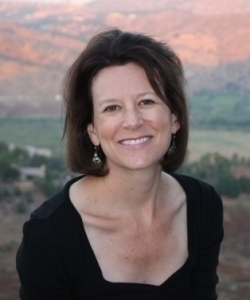 Midge Raymond
Midge RaymondToday I'm starting a new chapter in the life of The Alchemist's Kitchen (the blog, not the book) by introducing Midge Raymond, author of Forgetting English as my very first guest blogger. I love Midge's work where the borders of poetry and fiction seem to break down. Her stories are intensely lyrical and always take me traveling to other countries, other worlds. What could be better? Midge's book, Forgetting English has just been released this week from press 53. Press 53 is a small independent publisher that produces high quality books of poetry, fiction, and memoir.
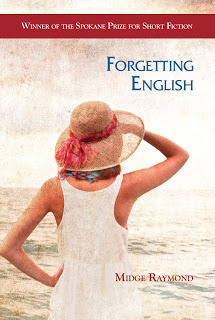
Writing about place can be a tricky thing. There's always the temptation—for me, anyhow—to let the exotic take precedent over the story. When I wrote the stories in Forgetting English , I worked hard to find that perfect balance: to let the setting—whether it was Antarctica or Africa—bring the story into sharp relief, to let the place enhance the story rather than overpower it.
Of course, this is probably why the collection took more than five years to put together.
Yet I didn't start out with a collection in mind when I began writing these stories; I simply wrote them, and only later did I begin to see how they were coming together. During the years in which I wrote these stories, I wrote many others as well, stories for which place didn't play as central a role. While setting is always important, I found that with these travel stories, the places in the book became almost like secondary characters, with traits of their own: Antarctica with its icy loneliness; Africa's Serengeti with its lurking dangers under a veneer of breathtaking beauty.
Yet even as place becomes more central, I've learned that we mustn't neglect the story. So I wanted to share a few tips I've learned along the way about how we can best write about place.
- Stories are about emotional journeys even more than literal ones—and readers need to connect to both. Place will serve as a backdrop in your writing, a very important one, but you don't want to neglect the characters within the place. For example, in "The Ecstatic Cry," which is about a biologist living in Antarctica, I created a character that is at home at the ends of the earth (literally)—and this required not only researching about life in Antarctica but a lot of exploration as to what sort of person would feel at home there and choose to live there above anyplace else.
- Always do your research, and don't skimp on details. These details are what bring a place, and a story, to life. I remember a reader telling me how one of the tiniest details in "Translation Memory" stuck with her—the fact that one of the Japanese toys in the story is called a Gloomy Bear. I used that detail in part because my research revealed that it was one of the most popular toys in Japan at the time—and yet, as readers of the story often notice, it resonates thematically as well.
- Don't let setting take over completely. I often had to pull back on my descriptions, reminding myself that not every single minute detail was necessary to get across a sense of place. Rather than use lengthy paragraphs to describe a place, sprinkle your descriptions throughout a piece, giving readers a sense of the setting through a character's lens rather than offering long passages of description. In this short paragraph, for example, my intention was to show a little bit about what it's like to live on a remote island in the South Pacific through one of the story's characters who has made her home there:
I look around, as if for clues that would make [my sister] less of a stranger. But her house is empty, except for the animals and her few spindly pieces of furniture. She's always lived sparely because she likes to be mobile. She doesn't believe in getting good at one thing and taking herself to the top; she sees jobs and homes as projects, as things she'll finish and then move on. Here, she has no job anymore; she lives off her garden of vegetables and off occasional tasks she can do for money or supplies. And this dim, stuffy little house has been home for twice the time she usually spends in any one place.
- Offer the unexpected. One writing exercise I use frequently in workshops is this: Think of the most beautiful place imaginable, then write about something tragic happening there—or, conversely: Conjure one of the most horrific places you can think of and write about something lovely happening there. I set the story "The Road to Hana" in Hawaii specifically because it's a place for lovers and honeymooners—and yet it's about a couple struggling with issues in their marriage. Always try to play with perceptions, to turn them around and upside down.
And finally, always remember that you needn't go far to write about place. I always enjoy traveling new places because it takes me out of my normal routine, my usual way of seeing things. But I've also found that all it takes is a little focus to do the very same in the café down the street. Good stories, and interesting settings, are everywhere—we just have to open our eyes to them.
To find out more about Midge or to get more ideas on writing prompts, writing advice, and the writing life you can visit her blog - a great resource.
Published on April 13, 2011 04:38
April 10, 2011
Major Jackson: Coming Attraction for Thursday 4/14 at SAL
 I hope Major reads this poem Thursday night. How could he not? An empire of handholding and park benches? I find really good love poems to be a rare breed. "Leave it All Up to Me" holds the electricity of new love -- the language pushes forward with a driving force that brings me to the finish line only to begin the marathon of that single kiss again and again. Hearing Major Jackson read this and other poems in Seattle is a rare treat. I think there are some tickets left -- only $10 for students, $20 for general seating. Hope to see you there. Click here to purchase tickets now!
I hope Major reads this poem Thursday night. How could he not? An empire of handholding and park benches? I find really good love poems to be a rare breed. "Leave it All Up to Me" holds the electricity of new love -- the language pushes forward with a driving force that brings me to the finish line only to begin the marathon of that single kiss again and again. Hearing Major Jackson read this and other poems in Seattle is a rare treat. I think there are some tickets left -- only $10 for students, $20 for general seating. Hope to see you there. Click here to purchase tickets now!Leave It All Up to Me
All we want is to succumb to a single kiss
that will contain us like a marathon
with no finish line, and if so, that we land
like newspapers before sunrise, halcyon
mornings arrived like blue martinis. I am
learning the steps to a foreign song: her mind
was torpedo, and her body was storm,
a kind of Wow. All we want is a metropolis
of Sundays, an empire of hand-holding
and park benches? She says, "Leave it all up to me."
And here is a whiteboard animation piece that does a wonderful job of joining images to words - especially mornings arrived like blue martinis.
Published on April 10, 2011 13:56
April 7, 2011
Advice for the Writer Just Starting Out and the Writer Who Wants to Keep Going

It's National Poetry Month and that means lots of poetry reading and hopefully, poetry writing. Recently, Elizabeth Corcoran asked me to answer some questions designed to help a beginning writer find her way in the literary world. I hope something I've written here might be useful to you or to a student you know...
Susan Rich explored the world before settling down to poetry. With a degree in International affairs from Harvard, Susan worked with Amnesty International, the Peace Corps, and as a human rights trainer in Gaza and the West Bank. She has written three poetry books, including her recent, The Alchemists Kitchen. With poems published in magazines from the Christian Science Monitor to the Alaska Quarterly, she has been awarded the Times Literary Supplement Award, a residency at Fundacion Valparaiso in Spain, an Artist Trust Fellowship, and a Seattle City Artist Project Award, as well as participation in the Cuirt Literary Festival in Galway, Ireland.
Like so many writers, your passion for writing was once almost crushed. After a decade of world travel and human rights work, you returned to writing. What advice would you give to a person who once loved to write, but put it aside because they were discouraged?
When I was a college student several of my male professors told me in subtle and not so subtle ways: you don't have what it takes to be a writer. I was young, fairly innocent, and believed too much in their authority as "professors." It took ten years of living in order for me to return to what I loved - creating music out of my imagination, creating a word order, structure, a line break that no one had quite done this way before.
So to answer your question simply - and yet the answer is far from simple - as a writer, don't ever give your power away. Don't let anyone else be the final judge of your work. This is tricky because a young writer, any writer, must open themselves to learning new literary tools - new ways of putting the words on paper.
What saved me as a poet and allowed me to return to the open field of the blank page was to check my ego at the door. I returned to writing poetry, for me and not for anyone else. I gave up my romanticized idea of the poet and wrote because it's (you've heard this before) what I needed to do. Mark Doty says in an interview with Bill Moyers that until he writes about an experience it seems incomplete - that the poem becomes a kind of varnish allowing his life (any life) to shine.
In the end, I have no recourse but to write to please myself.
Do you have suggestions of where a "want to be" writer or poet might begin? For example, you've said you don't get up two hours before breakfast every day.
}
Of course everyone is different; for me, I required the structure of a writing class - even if it was conducted around a dining room table. I wanted to learn. What led me back to a life of writing was a Tuesday evening poetry class conducted out of my teacher's home.
The teacher, because she herself felt snubbed by the Boston literary life, was emphatic that no one social class or gender owned the life of poetry. Three years flew by as I took weekly classes from various poets in the Boston / Cambridge area. Slowly, I started sending my poems into the world and, to my utter surprise, different journals began to accept them.
But here's the key: before I could send my work out, I needed to really accept that my poetry was my own and not up for final evaluation by others."Writing well is the best revenge," Zelda Fitzgerald explained in her novel. As the wife of F. Scott Fitzgerald, we can only assume how difficult it was for her to be viewed as a serious writer. I came across that quote when I was a teenager and it has served me well.
To continue reading this interview click here on The Writer's Connection.
Published on April 07, 2011 17:21
April 6, 2011
SAL Coming Attraction - Brian Turner, 7:30 pm, Thursday, April 15
Brian Turner has lived a most unconventional poet's life -- that of an infantry team leader in the US Army. HIs first book, Here, Bullet was in great part written while Brian was stationed in Iraq. In 2010, Turner published his second book, Phantom Noise which largely deals with the challenges of returning veterans. However, as Chris Abani said this morning on NPR/KUOW - our writing is never about our subject. Or I would add - the subject is just the beginning. Here's one poem so you can judge for yourself. Better yet, come out to Seattle Arts and Lectures at 7:30 next Thursday. Tickets still available here but "going quickly."
Here, BulletIf a body is what you want,[from HERE, BULLET, Alice James Books, Farmington, Maine, 2005]
then here is bone and gristle and flesh.
Here is the clavicle-snapped wish,
the aorta's opened valves, the leap
thought makes at the synaptic gap.
Here is the adrenaline rush you crave,
that inexorable flight, that insane puncture
into heat and blood. And I dare you to finish
what you've started. Because here, Bullet,
here is where I complete the word you bring
hissing through the air, here is where I moan
the barrel's cold esophagus, triggering
my tongue's explosives for the rifling I have
inside of me, each twist of the round
spun deeper, because here, Bullet,
here is where the world ends, every time.
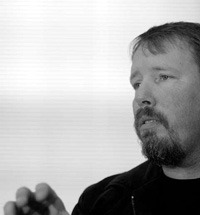 BRIAN TURNER earned an MFA from the University of Oregon before serving for seven years in the US Army. He was an infantry team leader for a year in Iraq with the 3rd Stryker Brigade Combat Team, 2nd Infantry Division. Prior to that, he deployed to Bosnia-Herzegovina with the l0th Mountain Division (1999-2000). His poetry has been published in Poetry Daily, The Georgia Review, American War Poems: An Anthology, and in the Voices in Wartime Anthology published in conjunction with the feature-length documentary film of the same name.
BRIAN TURNER earned an MFA from the University of Oregon before serving for seven years in the US Army. He was an infantry team leader for a year in Iraq with the 3rd Stryker Brigade Combat Team, 2nd Infantry Division. Prior to that, he deployed to Bosnia-Herzegovina with the l0th Mountain Division (1999-2000). His poetry has been published in Poetry Daily, The Georgia Review, American War Poems: An Anthology, and in the Voices in Wartime Anthology published in conjunction with the feature-length documentary film of the same name.
Published on April 06, 2011 06:00
April 5, 2011
A Writing Prompt and a Sweet Review of The Alchemist's Kitchen
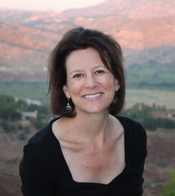
Thank you to Midge Raymond for inviting me to guest blog at her dynamite blog: Remembering English. Recently, Midge invited many poets and fiction writers to provide a writing prompt complete with a who, what, why, and how. You can find prompts at Remembering English by Kelli Russell Agodon, Elizabeth Austen, and Wendy Call. Midge Raymond also has a new collection of short stories about to be published: Forgetting English. More on that soon!
Here is a preview of Midge's introduction to my writing prompt: Approaching Creative Research.
I love that Susan has chosen an exercise on interviewing — one of a writer's greatest skills, right along with listening. Susan's exercise is inspired in part by her interviews with new Somali citizens for the Somali Voices project (these poems appear in her second book, Cures Include Travel).Enjoy — and don't miss Susan's lovely poem "Interview," which appears after the exercise.To read (and hopefully try) the writing prompt, Approaching Creative Research, click here
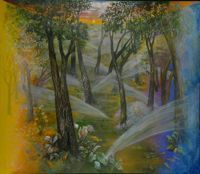
I think I'm writing my Thankful Thursday early because here is another thing I am thankful for. Thank you to Valparaiso Poetry Review and poet reviewer Rachel Dacus for a really thoughtful piece on The Alchemist's Kitchen. You can read the review here, but here's my favorite paragraph.
Susan Rich is singing in a key of tenderness, humor, and indignation. Only a poet of skill and understanding can manage this diversity of topics with an artistic transcendence that weaves through daily life and history, whether touched by the terrible, the sublime, or the simply routine. These poems serve as invocations, conjurings, and ultimately as eloquent prayers, as the opening poem, "Different Places to Pray," demonstrates -
And if you are still reading here is the web cam of the day -- I heard an NPR story about this eagle's nest at a raptor center in Iowa. The Decorah Eagle Cam provides an excellent view of the eagle and her babies. When I watched they were sleeping, but take a look here and see what's shaking in the nest. I feel sure this is a sign of spring. May it come soon to Seattle.
Published on April 05, 2011 18:11
April 3, 2011
Poetry Friends and Seattle Arts and Lectures: Thursday, April 14 @ 7:30pm
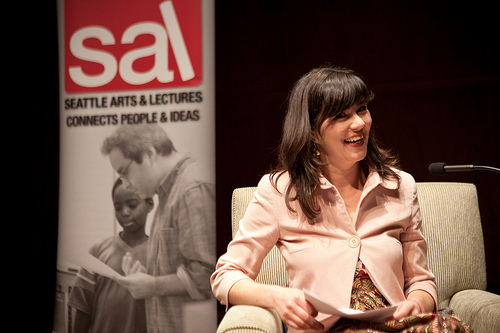 Photograph thanks to SALAlmost one year ago I attended a SAL event where Rebecca Hoogs introduced Sharon Olds with the most artful and engaging introduction I have ever heard. At the end of the evening I caught up with Rebecca and told her "Before I die, I hope that you'll introduce me for something - " I would have been fine with Rebecca introducing me to a strong cup of coffee or a new variety of blueberry plant. Instead, within a week, she sent me an email, "do you like your introductions funny" and invited me to read for National Poetry Month with my former University of Oregon MFA friends Brian Turner and Major Jackson. The evening will be sponsored by the Poetry Society of America and Alice Quinn, former poetry of the New Yorker, will be interviewing the three of us on stage.
Photograph thanks to SALAlmost one year ago I attended a SAL event where Rebecca Hoogs introduced Sharon Olds with the most artful and engaging introduction I have ever heard. At the end of the evening I caught up with Rebecca and told her "Before I die, I hope that you'll introduce me for something - " I would have been fine with Rebecca introducing me to a strong cup of coffee or a new variety of blueberry plant. Instead, within a week, she sent me an email, "do you like your introductions funny" and invited me to read for National Poetry Month with my former University of Oregon MFA friends Brian Turner and Major Jackson. The evening will be sponsored by the Poetry Society of America and Alice Quinn, former poetry of the New Yorker, will be interviewing the three of us on stage."Nervous as hell" I told a friend recently and she replied, "it would make anyone with a pulse nervous." My plan is to get all of my nervousness out far before I actually walk on stage. I'm already putting together my play list and if you have any favorites you'd like to hear next Thursday, April 14th, please don't be shy but leave me a comment here. If you want to purchase tickets, there are still some available here. And even if you've seen me read before, you don't want to miss Brian and Major. I've seen them both read and they are utterly engaging. Guaranteed. Poetry, Benaroya Hall, and Wild Ginger next door - it's an evening not to be missed.
[image error]
Brian Turner, Major Jackson & Susan RichTHU, APR 14, 2011, 7:30 PMBenaroya Hall \ Illsley Ball Nordstrom Recital HallCo-Presented by Poetry Society of America
This Poetry Series Special Event features an introduction and moderated Q&A from Alice Quinn, former poetry editor at the New Yorkerand now Executive Director of the Poetry Society of America. To continue reading click here
[image error]
Published on April 03, 2011 19:56
Poetry Friends and Seattle Arts and Lectures: Thursday, April 14
 Photograph thanks to SALAlmost one year ago I attended a SAL event where Rebecca Hoogs introduced Sharon Olds with the most artful and engaging introduction I have ever heard. At the end of the evening I caught up with Rebecca and told her "Before I die, I hope that you'll introduce me for something - " I would have been fine with Rebecca introducing me to a strong cup of coffee or a new variety of blueberry plant. Instead, within a week, she sent me an email, "do you like your introductions funny" and invited me to read for National Poetry Month with my former University of Oregon MFA friends Brian Turner and Major Jackson. The evening will be sponsored by the Poetry Society of America and Alice Quinn, former poetry of the New Yorker, will be interviewing the three of us on stage.
Photograph thanks to SALAlmost one year ago I attended a SAL event where Rebecca Hoogs introduced Sharon Olds with the most artful and engaging introduction I have ever heard. At the end of the evening I caught up with Rebecca and told her "Before I die, I hope that you'll introduce me for something - " I would have been fine with Rebecca introducing me to a strong cup of coffee or a new variety of blueberry plant. Instead, within a week, she sent me an email, "do you like your introductions funny" and invited me to read for National Poetry Month with my former University of Oregon MFA friends Brian Turner and Major Jackson. The evening will be sponsored by the Poetry Society of America and Alice Quinn, former poetry of the New Yorker, will be interviewing the three of us on stage."Nervous as hell" I told a friend recently and she replied, "it would make anyone with a pulse nervous." My plan is to get all of my nervousness out far before I actually walk on stage. I'm already putting together my play list and if you have any favorites you'd like to hear next Thursday, April 14th, please don't be shy but leave me a comment here. If you want to purchase tickets, there are still some available here. And even if you've seen me read before, you don't want to miss Brian and Major. I've seen them both read and they are utterly engaging. Guaranteed. Poetry, Benaroya Hall, and Wild Ginger next door - it's an evening not to be missed.
[image error]
Brian Turner, Major Jackson & Susan RichTHU, APR 14, 2011, 7:30 PMBenaroya Hall \ Illsley Ball Nordstrom Recital HallCo-Presented by Poetry Society of America
This Poetry Series Special Event features an introduction and moderated Q&A from Alice Quinn, former poetry editor at the New Yorkerand now Executive Director of the Poetry Society of America. To continue reading click here
[image error]
Published on April 03, 2011 19:56
March 31, 2011
Thank You to the Poetry People I Know - and the Ones I Don't

I know several people give thanks every Thursday on their blogs, but I am not a consistent type. Instead, today, I will give thanks times three or thanks to the third power. Maybe even the 4th power of thanks - we'll see.
First, thank you to Robin Becker, Poetry editor of the Women's Review of Books and poet extraordinaire. The current issue of the Women's Review of Books, published out of Wellesley College is a publication that deserves far more attention. As well as publishing poetry, the review consistently publishes articles on books concerning everything from Marilyn Monroe to the Urban Bush Women to photography. It's a smart, vibrant journal with high production value.

Next, thank you to the Whidbey Island Writers Conference coming up this very weekend. In addition to headliner Garth Stein, you've got the chance to see Lana Hechtman Ayers, Sheila Bender, Janna Esarey and Anjali Banerjee. This is my second time as a presenter at this conference and I'm looking forward to it. One thing that is unique to this conference are the Fireside Chats. Local islanders open their homes - and their hearts to host an intimate group of ten to twenty conference participants and (usually) three writers. There are a variety of different registration options -- know that a Fireside Chat is actually three different presenters!

Finally, I am feeling particularly thankful for my friend Kelli Russell Agodon. She is a poet, editor, teacher, and friend extraordinaire. For National Poetry Month, Kelli has initiated the Big Poetry Giveaway where poets across the blogosphere are giving away not only their books of poetry, but also a book by another author that they loved. You don't have to be a blogger or a poet to participate. Simply click here to see the list of participating poets and enter your name. Kelli is also my partner in crime for the first ever Poets on the Coast Weekend Writing Retreat for Women this coming September. If you haven't read her new book, Letters from the Emily Dickinson Room, you really should.
It's good to have friends, journals, and conferences to be thankful for. I hope you've found something here to further explore -- be it a Weekend Retreat or a new writer.
Published on March 31, 2011 20:47
March 28, 2011
It's Almost that Time - National Poetry Month Big Poetry Giveaway
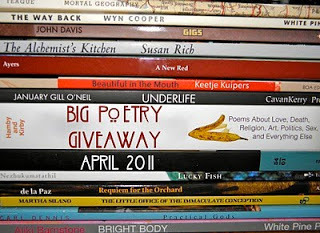
Hurray for April; we're almost there! I don't know about anyone else, but for me, April tends to be a good deal more fun than my March. Of course this year, with a great trip to the University of Wisconsin - Madison to celebrate 50 Years of Africa and the Peace Corps - April is going to have to be outstanding!
To help the month get rolling, Kelli Russell Agodon, great poet and friend, is once again hosting the Big Poetry Giveaway at her blog, Book of Kells. I loved being part of this project last year and am signing up for a second time. Here's the deal: in the spirit of creativity and community, poets are giving away two books -- one of their own and one by a poet they love. All you need to do is leave a comment at the end of this post in order to be entered in the drawing. The first giveaway is ejo - Poems Rwanda 1991-1994 by Derick Burleson. I have been an admirer of Derick's work for a long time and although we are Facebook friends and have one very dear friend in common, Madison was our first chance to spend time together.
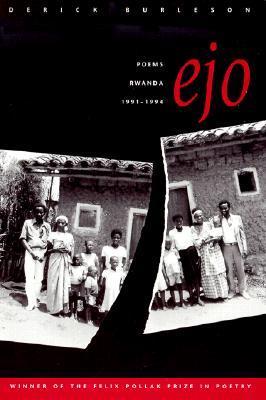
If you've heard Derick read, you know he is charming, funny, and honest. He's also not too high falutin to get in the way back of a Subaru wagon when the situation calls for such measures. Derick read "Howdy" at the Orpheum Theater in Madison, WI and had the whole audience hanging on his every syllable - even the spaces in-between the syllables. In the morning Derick read "Remera Arrives" and told our audience the story of saving Remera's life - first with the gift of a rain jacket and eventually by helping him to get out of Rwanda to the United States. In case you haven't heard, there was a Rwandan Genocide in 1994 and these poems deal both with this as well as the years before this when Burleson was a Peace Corps Volunteer teaching English. There are several persona poems in the collection such as "Remera Arrives." This is a book you need to read - and although there are heartbreaking poems -- there is also much joy.
REMERA ARRIVES Houston, 1997
Oh my God what I have done?
The climate, it is very hot here.
All people, where they are?
I hear four millions living here.
But I see no persons walking.
There are many cars. All people have one.
Inside the house it is so cold.
They call that conditioning air.
Mostly all people stay inside.
Derick is grown fat and ballhead.
And me too, I am fat now.
During the war, I almost starved to die.
But now I let grow my dreadlocks.
You must to have papers here before anything.
That is same for my country.
Food here is fake. Everythings puts in cans.
Cheeseburger is not real food.
The air smells like l'essence. Barbeque is O.K.
For Fourth July they explode bombs
over the city, like back home
in Kigali on Liberation Day.
Me, I am learning slowly English.
Here all people say Howdy to mean greetings.
They smile at all the times. That is fake too. HowdyAnd then they were all staring at me.
So I shout: This is a typical American greeting.
C'est une salutation typiquement Am'ricaine.Please understand, this is the first day of school
and the year before, there was no school
because of the war, une ann'e blanche, a white year,a blank year, and school was supposed to start
in September and it's October already, the first day
of school a month late, just when we've all begunto wonder if school would start this year or not.
123 unpronounceable names, every first-year
pre-med student in Rwanda gathered here in this roomto learn from me all the English they'd ever need:
If a bomb went off it would be really tragic.
They throw wads of notepaper, gyrate their hips,sing Mama We! whistle, sprint up and down the aisles,
leap from seat to plastic seat. I stumble down
each concrete step to the auditorium's bowelsas if I were descending the icy rungs of hell,
and they shriek at me in a language I can't understand:
Umuzungu urashaka iki? Umuzungu subira iwanyu!White man what do you want? White man go home!
The microphones stainless steel lung looks like
something with which to club them into submission.So I rear back and holler Howdy, sheer horror
takin' me back to that Oklahoma twang I thought
I'd done gone and give up fer good. And whenthey holler back: How-Dee, it's an amazing grace.
So I do it again and so do they. All semester I howl
English and they bellow it back, the future doctorsof Rwanda chanting in unison: shinbone connected
to the kneebone, kneebone connected to the hipbone.
And by December when I meet them between classesunder the blossoms of the campus poinsettia, I sayMuraho and they say How-dee. I say Amakuru and they askHow're ya'll doin? I say Nimeza and they say Jes fine.
--- Derick Burleson
In the spirit of the Peace Corps experience, I will also be giving away my first book, The Cartographer's Tongue / Poems of the World. Although the book is my first, I think I have to admit is also my favorite -- perhaps because of the Peace Corps poems. [image error]
And here's a poem from this collection; another Peace Corps poem.
Lost By Way of Tchin-Tabarden by Susan RichRepublic of Niger
Nomads are said to know their way by an exact spot in the sky,the touch of sand to their fingers, granules on the tongue.
But sometimes a system breaks down. I witness a shift of light,study the irregular shadings of dunes. Why am I traveling
this road to Zinder, where really there is no road? No service stationat this check point, just one commercant hawking Fanta
in gangrene hues. C'est formidable! he gestures --- staring aheadover a pyramid of foreign orange juice.
In the desert life is distilled to an angle of wind, camel droppings,salted food. How long has this man been here, how long
can I stay contemplating a route home?It's so easy to get lost and disappear, die of thirst and longing
as the Sultan's three wives did last year. Found in their Mercedes,the chauffeur at the wheel, how did they fail to return home
to Ágadez, retrace a landscape they'd always believed?No cross-streets, no broken yellow lines; I feel relief at the abandonment
of my own geography. I know there's no surveyor but want to imaginethe aerial map that will send me above flame trees, snaking
through knots of basalt. I'll mark the exact site for a lean-towhere the wind and dust travel easily along my skin,
and I'm no longer satiated by the scent of gasoline. I'll arrive thereout of balance, untaught; ready for something called home.Just leave a comment below and you will be entered in the Big Poetry Giveaway. Check out Kelli's Book of Kells to see what other poets are participating! Maybe you will join in, too?
Published on March 28, 2011 21:21
March 24, 2011
Spring Break and Story Corps: Coming Attraction!
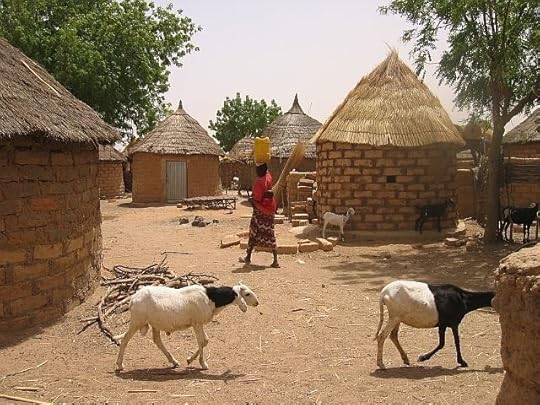
It's wild to remember that this -- or something like it -- was my everyday experience twenty-five years ago. Just writing that makes me feel so old. How can this be? I don't even have grey hair! At the Peace Corps and Africa conference this weekend, I am bound to be confronted by old friends as well as a few former demons. My time in Niger ended with a bicycle accident --- for medical reasons I was flown out of Niger just shy of my two year commitment.
However, this weekend I am focused on remembering the positive aspects of my two years teaching, traveling, and learning about life in a way I never could if I had stayed home. The poem below is what (I think) I will be reading this Saturday night at the Orpheum Theater in Madison, WI. Ironically, this week is also my spring break. The poem explores the multiple meanings behind an evening in Agadez, Niger that I shared with two other Volunteers and three Fulani Wodaabe men.
Spring Break Republic of Niger
It's a universal business that's brought them here, into the night outside Agadez, into the ragged trimmings of light.
Past lean-tos of plaited mats, past fires that flare in an unfamiliar codewe follow these Wodaabe men — excited, raw nerved, enthralled.
What do they make of les Mademoiselles Américaine folded in dresses as formless as millet sacks, skin the color of crusted goat cheese?
Do they mock Belinda's rosary of facts on Nigerien venereal disease,laugh at Beverly's blue inked notes: A Chat with Nomadic Chiefs?
Lives away from the cas de passage, from the signposts and streetsof a set geography, we've been invited for tea and mangoes —
to breathe in the wood smoke that will linger on our clothes, mix with the unmistakable sweet hum of the body.
Along the bench one of us, one of them, our heads bent back to hoard the sky as the stars throw themselves into arcs
of persistent flight. Dari stretches his elegant limbs and I discover fingertips on my thigh, an arm nestled against my ribs.
The men know the art of insinuation, know how to penetrate a woman with their eyes, hold her beyond the palm of conversation,
no deception save desire. My thumbs hook into the edge of my sleeves, but I'm just along for the view — for the desert scent of truck exhaust and jasmine,
hibiscus with a tinge of extremity. Il n'y as pas d'etoiles chez vous? Dari askslifting his lashes to a bottle of Visine. His lipstick glistening, gold make-up
marking the rise of high boned cheeks. Conversation fadesand I admire my date's slim hips, his winged shoulders,
poised, inviting. But too much memory offends. To him this is nothing new, only a chance to see if it's true that Peace Corps girls will do for you presque tout.
Their offer it seems almost impolite to refuse, nous sommes trois et trois, but that's what I and Belinda and Beverly choose — we say no to pleasure,
to pairing off behind sand dunes. Say no to foreign hand-stitched robes, to anything we wouldn't know how to undo.
From The Cartographer's Tongue, Poems of the World, White Pine Press, NY
The other very cool part of the weekend is that I will be joining Niger RPCV Jim Delehanty in a Story Corps Booth on Friday morning. Jim and I will meet for the first time since 1985 to interview each other about our Peace Corps experiences. How cool is that? I get to be part of history in a concrete way. The pressure is on to remember something profound from that time --- to remember specific students, or friends or just the smell of the air -- the different tastes. How everything was a mystery -- and still is.
Here is more about Story Corps:
Our mission is to provide Americans of all backgrounds and beliefs with the opportunity to record, share, and preserve the stories of our lives. Since 2003, StoryCorps has collected and archived more than 30,000 interviews from more than 60,000 participants. Each conversation is recorded on a free CD to share, and is preserved at the American Folklife Center at the Library of Congress. StoryCorps is one of the largest oral history projects of its kind, and millions listen to our broadcasts on public radio and the web. Check it out!
Published on March 24, 2011 05:00



